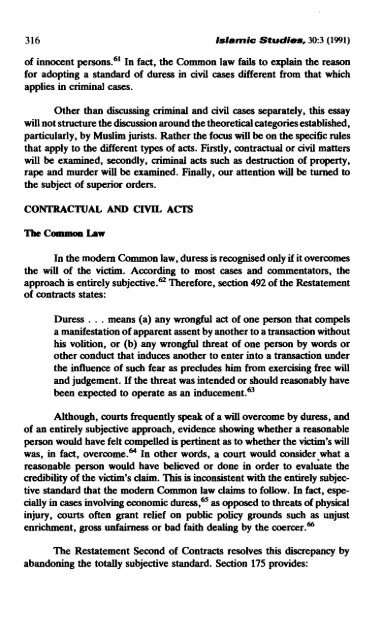LAW OF DURESS IN ISLAMIC LAW AND COMMON LAW: A ...
LAW OF DURESS IN ISLAMIC LAW AND COMMON LAW: A ...
LAW OF DURESS IN ISLAMIC LAW AND COMMON LAW: A ...
You also want an ePaper? Increase the reach of your titles
YUMPU automatically turns print PDFs into web optimized ePapers that Google loves.
316 Islamic Studies, 30:3 (1991)<br />
of innocent persom6' In fact, the Common law fails to explain the reason<br />
for adopting a standard of duress in civil cases different from that which<br />
applies in criminal cases.<br />
Other than discussing criminal and civil cases separately, this essay<br />
will not structure the discussion around the theoretical categories established,<br />
particularly, by Muslim jurists. Rather the focus will be on the specific rules<br />
that apply to the different types of acts. Firstly, contractual or civil matters<br />
will be examined, secondly, criminal acts such as destruction of property,<br />
rape and murder will be examined. Finally, our attention will be turned to<br />
the subject of superior orders.<br />
CONTRACTUAL <strong>AND</strong> CIVIL ACTS<br />
In the modem Common law, duress is recognised only if it overcomes<br />
the will of the victim. According to most cases and commentators, the<br />
approach is entirely ~ubjective.~' Therefore, section 492 of the Restatement<br />
of contracts states:<br />
Duress . . . means (a) any wrongful act of one person that compels<br />
a manifestation of apparent assent by another to a transaction without<br />
his volition, or (b) any wrongful threat of one person by words or<br />
other conduct that induces another to enter into a transaction under<br />
the influence of such fear as precludes him from exercising free will<br />
and judgement. If the threat was intended or should reasonably have<br />
been expected to operate as an ind~cement.~~<br />
Although, courts frequently speak of a will overcome by duress, and<br />
of an entirely subjective approach, evidence showing whether a reasonable<br />
person would have felt compelled is pertinent as to whether the victim's will<br />
was, in fact, overcome.64 In other words, a court would consider what a<br />
reasonable person would have believed or done in order to evalkte the<br />
credibility of the victim's claim. This is inconsistent with the entirely subjec-<br />
tive standard that the modem Common law claims to follow. In fact, espe-<br />
cially in cases involving economic duress,65 as opposed to threats of physical<br />
injury, courts often grant relief on public policy grounds such as unjust<br />
enrichment, gross unfairness or bad faith dealing by the ~oercer.~~<br />
The Restatement Second of Contracts resolves this discrepancy by<br />
abandoning the totally subjective standard. Section 175 provides:
















